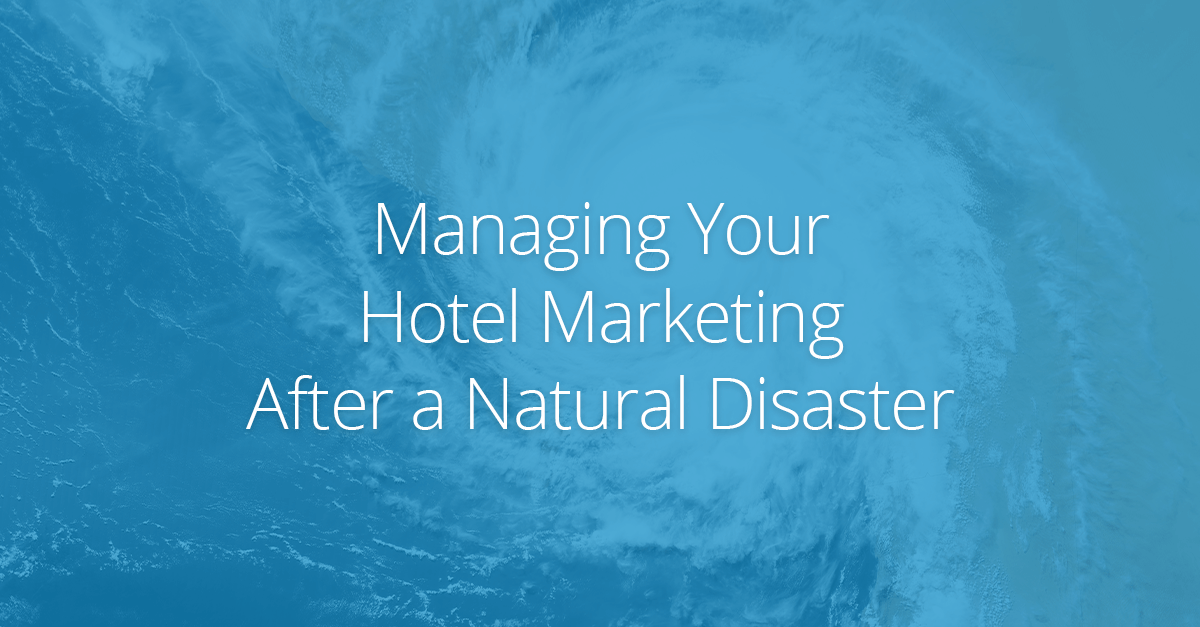Blog
Managing Your Hotel Marketing After a Natural Disaster
Published September 1, 2017 by Leah Richardson

It is with heavy hearts that we’ve witnessed the destruction left by Hurricane Harvey on the Gulf Coast this week. With our headquarters in Fort Worth and several team members that have strong ties to the Houston area, it’s safe to say that we won’t soon forget about this storm that hit so close to home. As we consider the immediate impact of Hurricane Harvey and the thousands that have been affected, it’s difficult to process all of the long-term ramifications it will have on the city of Houston and the surrounding areas. The estimated financial impact from this storm is $190 billion, a number which seems to increase daily, making this the costliest storm in United States history. We’ve already seen how the travel industry has been impacted by airport shutdowns, flooded hotel lobbies, stranded guests, and event cancellations. But we’re left to wonder what the hotel market and tourism industry will look like on the Gulf Coast in six months or even a year from now.
Preparing for the Unthinkable
While it’s impossible to predict the total effects of a natural disaster before it happens, you can always be a couple of steps ahead by having a plan of action in place. These preventative measures are especially important if you manage properties in areas that are prone to flooding, earthquakes, tornadoes, or other natural activity. Our team put together a list of recommendations based on the lessons we’ve learned in the aftermath of natural disasters over the past two years. 1. Check advertising performance on affected properties. If your property is forced to shut its doors even temporarily due to structural damage or flooding, don’t forget to scale back your advertising spend so you’re not wasting ad dollars. Demand for rooms may initially increase as victims, emergency responders, and volunteers look for temporary housing, so be sure to monitor your metasearch performance as demand rises and falls. If you’re using a metasearch publisher that doesn’t have live query, you’ll also want to keep a close eye on your availability. 2. Review any scheduled announcements or campaigns. Consider hitting the pause button on any scheduled email campaigns, blog posts, or tweets that could be viewed as insensitive. Anything that is too salesy may not be well-received when the last thing people have on their minds is booking a vacation. 3. Closely monitor social media and reviews. As people increasingly turn to social media as a source of news and information during crises, your social team should be considered an extension of your PR team. Use social listening tools and perform relevant searches to watch for any stories that mention your brand. Be prepared to respond quickly to negative sentiment on social media or hotel reviews. 4. Create a communication plan. Have a clear plan for what needs to be communicated to employees, customers, and other stakeholders. You may want to consider having a centralized location to share important status updates so that you can point all users to a single URL, minimizing the risk of misinformation or crossed wires. 5. Involve your CSR team. When making plans for any internal or external announcements, don’t forget to loop in your Corporate Social Responsibility team. If the company is sponsoring any relief efforts (through a disaster relief fund, matching employee donations, or organizing volunteer groups), you’ll definitely want to make sure your marketing team is aware of and prepared to communicate these initiatives. 6. Look for the silver linings. When hard times hit, there are always stories of hope and positivity to be found. Encourage your team to highlight the moments of good and seek out ways for your company to make a positive difference. Offering vacant rooms to families who’ve lost their homes, discounting rooms for emergency responders, waiving cancellation fees, and starting a donation drive are just a few inspiring examples we’ve seen from hotel brands during Hurricane Harvey. We hope this short list of ideas will help you prepare your marketing team to respond quickly in the wake of a natural disaster. If you have any additional tips or personal experiences you’d like to share, leave a comment below.You may be interested in
GET IN TOUCH
Ready to get started?
Don’t let your brand get lost in the noise. Partner with Koddi to unlock the power of commerce media and transform the way you engage with your customers. Our team of experts is here to help you navigate complexities and develop a strategy that drives results — no matter what industry – in as little as 45 days.